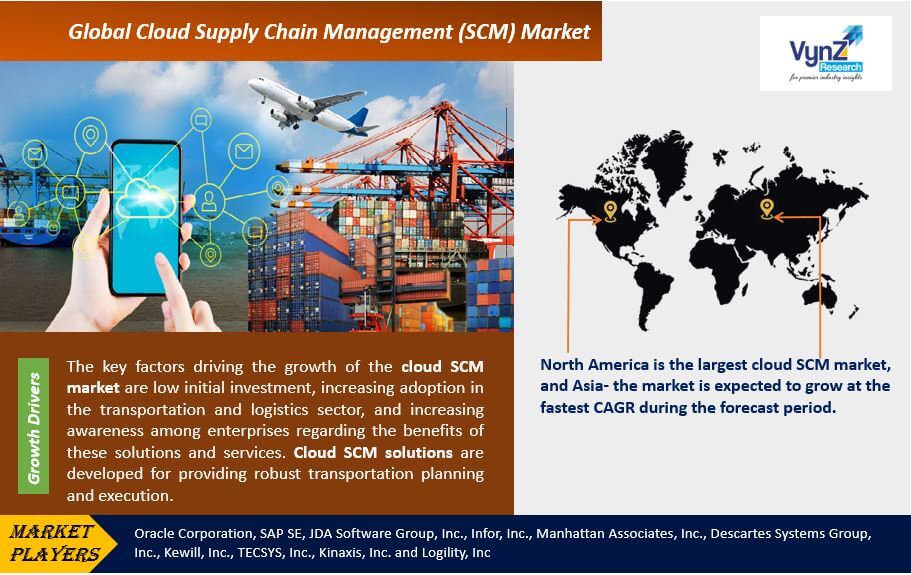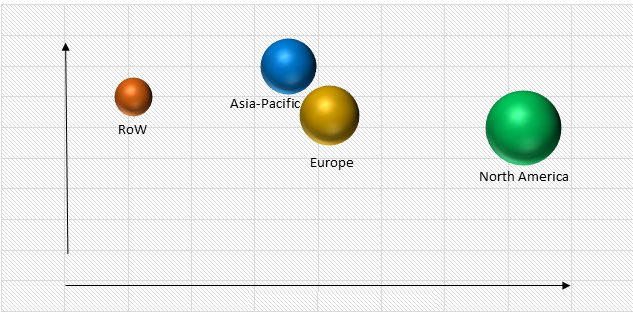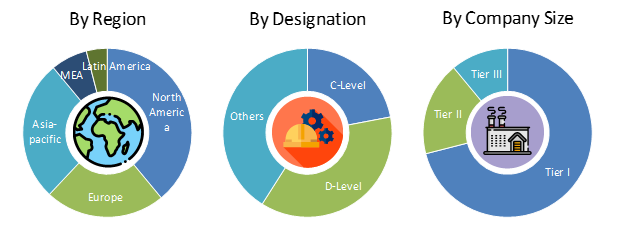| Status : Published | Published On : Mar, 2024 | Report Code : VRICT5030 | Industry : ICT & Media | Available Format :

|
Page : 151 |

Global Cloud Supply Chain Management (SCM) Market – Analysis and Forecast (2025-2030)
Industry Insights by Solution (Inventory & Warehouse Management, Transportation Management, Demand Planning & Forecasting, Logistics Management, Product Life-Cycle Management, Sales & Operations Planning, Product Master Data Management, Order Management, and Procurement & Sourcing), by Service (Support & Maintenance, Training & Consulting and Managed Services), by Deployment Type (Public Cloud, Hybrid Cloud, and Private Cloud), by User Type (Small & Medium Enterprises, and Large Enterprises), by Industry (Retail & Wholesale, Energy & Power, Transportation & Logistics, Food & Beverage, Manufacturing, Hospitality, Government, and Healthcare & Lifesciences) and By Geography (North America, Europe, Asia-Pacific, Middle East, and Rest of the World)
Industry Overview
The Global Cloud Supply Chain Management (SCM) market is expected to grow at 21.0% CAGR during the forecast period with the market size reaching USD 17.3 billion by 2030.
The size of this market depends on different solutions such as logistics management, product life-cycle management, warehouse and inventory management, demand planning, and forecasting.
The growth of this market has been significant over the past couple of years due to a reduction in the cost of operation as well as in the probability of failures.Overall, the benefits, features, and advanced functionalities of the cloud SCM allow businesses to stay competitive and ahead in the race. All these drive the growth of the cloud SCM market.
After COVID-19, the need for more reliable technologies for supply chain management grew significantly. This is mainly because people stayed at home and needed to access several services from their homes and any location. This pushed the cloud SCM market further since it offered greater visibility to the supply chains and allowed effective management of an otherwise chaotic situation.

Cloud Supply Chain Management (SCM) Market Segmentation
Insight by Solution
According to the solutions offered, the global cloud supply chain management (SCM) market can be divided into different heads, such as logistics management, inventory management, warehouse management, product life-cycle management, transportation management, demand planning,and forecasting, product master data management, sales and operations planning, order management, procurement,and sourcing.
Out of all these heads, the largest share of the market is in demand planning & forecasting solutions. It also has the highest growth rate and will continue to hold its position during the forecast period. This is mainly because these solutions not only help organizations forecast demand and revenue earning but also help them manage their inventory accordingly and optimally.
Insight by Service
Based on the major services, the market can be divided into training and consulting, support and maintenance, and managed services. Out of these all, the support and maintenance services segment is expected to grow at a rapid pace (CAGR 24%) during the forecast period. This is due to the higher demand for timely support and management services by organizations to help them manage their supply chain uninterruptedly and more efficiently.
Insight by Deployment Type
The market is divided into public cloud, private cloud, and hybrid cloud, based on deployment type. Out of these three segments, the hybrid cloud segment is the largest contributor to the market. However, the private cloud segment is also expected to grow at a rapid rate during the forecast period because of the wide range of benefits it offers, such as easy accessibility, scalability, instant provisioning, and better expansion opportunities of server base and virtualized resources. All these lead to higher adoption by enterprises.
Insight by User Type
Based on user type, the market can be divided into large enterprises and SMEs or small and medium enterprises. and large enterprises. Out of them, large enterprises typically have a more complex structure and need a more efficient management system. As a result, they are the higher users and contributors to the market.
Insight by Industry
Based on the industry verticals, the market is divided into retail, wholesale, transportation, logistics, manufacturing, food & beverage, government, hospitality, healthcare & lifesciences, and power and energy sectors.
Out of all these sectors, the power and energy sector is the highest contributor to the market and will grow at a fast pace during the forecast period. Once again, the complex structure is the main cause for their higher demand and adoption of cloud SCM to ensure resilience and efficiency.
For example, Buy Online, Pickup In-Store (BOPIS) is the latest trend followed in the supply chain industry. Designed based on the understanding of the customer journey and to offer better service, large retailers, such as Walmart, have taken up this trend and set up several pickup towers in their stores. This increases footfall in the stores. The system uses cloud-based software, mobile architectures, and devices that are linked to the data and inventory of the supply chain.RD_TABLE
Industry Dynamics
Cloud Supply Chain Management (SCM) Market Growth Drivers
Cloud SCM services and solutions help in robust planning and execution in the logistics and transportation departments. It helps in tracking different activities and managing them more efficiently, resulting in higher adoption.
These solutions do not need on-site installation and management. Users do not need to invest upfront in building suitable infrastructure to use the solutions and services and bear the recurring cost of maintenance and fees for software licensing.
It is a low-cost alternative to conventional systems. It lowers freight costs and helps maximize service levels by automating several business operations. Enterprises can collaborate with others in similar businesses to perform better and manage their logistics operations with more efficiency. It also leads to cost savings because enterprises pay only for the specific service they need and use.
Enterprises can use these solutions according to their requirement scaling their operations up or down based on the needs of their specific type of business, the changing market conditions, fluctuations, and business expansion needs. There are no limitations as in traditional systems due to the elasticity or flexibility of the cloud platforms. Businesses can adjust their capacity and resources accordingly.
Real-time collaboration is facilitated by cloud SCM solutions and services. This helps in sharing information with other stakeholders within the supply chain more quickly and efficiently, eventually helping in better management.
Enterprises can have better visibility into their inventory, orders, and shipments, and track everything more accurately. This, in turn, helps in better decision-making, reduces delays, eliminates errors and inefficiencies, and improves overall performance.
Another significant factor that drives the growth of the cloud SCM market is the rising awareness among organizations about the benefits of cloud SCM solutions and services.Organizations do not need to invest time in deploying these systems and managing the operations.
These solutions offer better time to value than traditional systems because everything from investment, deployment, upgrades, and maintenance is done by the servers. This means that the users do not need to pay more to access the latest features and functionalities. This reduces cost, disruption, and downtime.
Organizations can analyze large volumes of supply chain data due to better machine learning and advanced analytical abilities and have better insights to identify specific trends, forecast demand, increase sales, manage inventory in a better way, and improve their overall performance and customer satisfaction level.
The favorable pricing and subscription-based structure of cloud SCM also drives its growth making it within the means of most businesses irrespective of their size. These services even allow them to comply with the stringent regulatory requirements for traceability, sustainability, and ethical sourcing. As a result, there is a significant rise in the popularity of these services and solutions, leading to higher adoption and market growth.
Cloud Supply Chain Management (SCM) Market Restraints
Complex structure and difficulties in the implementations are the most significant hindrances to the growth of the cloud SCM market, especially for large enterprises.
Another significant retraining factor is the concern for data privacy and security by enterprises. There are also some significant issues in the segregation of data and its management.
In addition to that, concerning developing countries, their underdeveloped infrastructure also prevents the implementation of such advanced systems and solutions. There is a serious shortage of qualified professionals and technical experts to manage these systems in these countries, which hinders the growth of this market in developing and underdeveloped countries.
In terms of regulations and compliance, specific industries like finance, healthcare, and others that operate in excessively regulated environments face significant problems in adhering to the set standards and legislations for data protection. This is mainly due to the differences in the regulatory frameworks of different cloud-based systems.
Cloud Supply Chain Management (SCM) Market Geographic Overview
Based on geographic regions, the cloud SCM market can be divided into North America, Asia Pacific, Latin America, and the Rest of the World.
Out of all these regions, the market is the largest and most flourishing in North America, with the US leading the way, mainly due to the improved infrastructure.This region is believed to have adopted and invested extensively in the latest technologies in the information and communication sector to enhance its operations and services. All these lead to a higher demand for such specialized and beneficial services across a wide range of industries, which will continue to grow at a high CAGR during the forecast period.
Close behind is the APAC region, which will grow at a significantly fast CAGR during the forecast period. This is due to the higher initiatives taken by the governments to promote digital operations through innovative technologies. Over the years, investments in internet-based and digital economy will be higher promoting the use of cloud-based technologies for making digital transformation. Several companies have already started to invest in smart procuring and manufacturing initiatives, which will drive the cloud SCM market in the APAC countries significantly in the forecast period.
Global Cloud Supply Chain Management (SCM) Market, By Region

Cloud Supply Chain Management (SCM) Market Competitive Insight
The benefits and advanced features of cloud SCM have encouraged market participants to expand their portfolio and adopt cloud SCM to ease their supply chain management operations and reduce the complexities involved in it. Market players in the Cloud SCM industry are expanding their product portfolio with a focus on easing the complexities of the supply chain. Oracle Corporation, SAP SE, JDA Software Group, Inc., Infor, Inc., Manhattan Associates, Inc., Descartes Systems Group, Inc., Kewill, Inc., TECSYS, Inc., Kinaxis, Inc. and Logility, Inc., are some of the key players offering solutions and services for Cloud SCM.
Recent development by Key Players
14 Mar 2024 - Oracle has added new capabilities to its Supply Chain and Manufacturing (SCM) Fusion Cloud to help enterprises manage their logistics. The new features include enhanced logistics network modelling, a new trade incentive program, expanded business intelligence capabilities and an updated Transportation Management Mobile application
27 Nov 2023 - Kärcher, the world leader in cleaning technology, shall migrate its entire SAP environment to AWS, which shall include human capital management (HCM), enterprise resource planning (ERP) applications and supply chain management (SCM). The migration is the final step in moving Kärcher’s IT infrastructure to the cloud. The company will apply AWS’s portfolio of cloud technologies, including analytics, and machine learning (ML) and Internet of Things (IoT) to develop new business models, deliver innovations in software services, like drive efficiencies, real-time billing and operations of smart cleaning devices across the world.
The Cloud Supply Chain Management (SCM) Market report offers a comprehensive market segmentation analysis along with an estimation for the forecast period 2025–2030.
Segments Covered in the Report
- By Solution
- Inventory & Warehouse Management
- Transportation Management
- Demand Planning & Forecasting
- Logistics Management
- Product Life-Cycle Management
- Sales & Operations Planning
- Product Master Data Management
- Order Management
- Procurement & Sourcing
- By Service Type
- Support & Maintenance
- Training & Consulting
- Managed Services
- By Deployment Type
- Public Cloud
- Hybrid Cloud
- Private Cloud
- By User-Type
- Small and Medium Enterprises
- Large Enterprises
- By Industry
- Retail & Wholesale
- Energy & Power
- Transportation & Logistics
- Food & Beverage
- Manufacturing
- Hospitality
- Government
- Healthcare & Lifesciences
Region Covered in the Report
- North America
- U.S.
- Canada
- Mexico
- Europe
- Germany
- U.K.
- France
- Italy
- Spain
- Russia
- Rest of Europe
- Asia-Pacific (APAC)
- China
- Japan
- India
- South Korea
- Rest of Asia-Pacific
- Rest of the World (RoW)
- Brazil
- Saudi Arabia
- South Africa
- U.A.E.
- Other Countries
PRIMARY RESEARCH INTERVIEWS - BREAKDOWN

Source: VynZ Research
Frequently Asked Questions
Purchase Options
Latest Report
Research Methodology
- Desk Research / Pilot Interviews
- Build Market Size Model
- Research and Analysis
- Final Deliverabvle
Connect With Our Sales Team
- Toll-Free: 1 888 253 3960
- Phone: +91 9960 288 381
- Email: enquiry@vynzresearch.com
Cloud Supply Chain Management (SCM) Market
